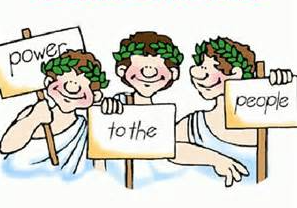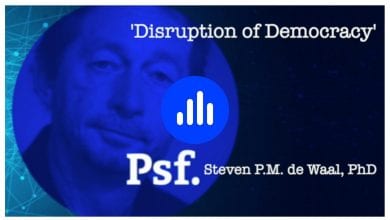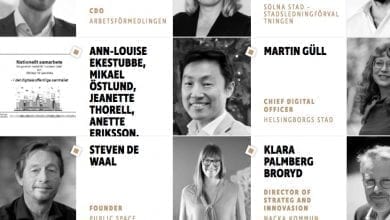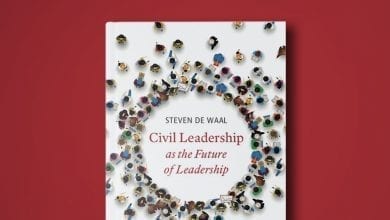Disruptive citizenship
The rising power of citizens
Disruptive citizen is a publisher, a reader and a criticaster at the same time

We know disruption as a strategic phenomenon in the market. Many professional politicians and executives of public service organizations wrongly think (or hope) it is a phenomenon restricted to the market.
How nót to lose contact with your customers or citizens
They ignore the underlying revolution in ICT worldwide, which provides direct communication and information tools to citizens. This new power has already an enormous impact on their mentality and attitude and they now experience and exercise this new power in politics and public services.
There is a vast insightful strategic literature on disruption. After years of dismissal and denial, most CEO’s now acknowledge it and learn to change their strategy. Otherwise they will lose their customers and in the end go broke or will be taken over by the new giants and players in the platform economy. They have learned it the hard way from a lot of examples around them. So far this is old news for real entrepreneurs, strategists and market watchers.
“The phenomenon of disruption is not restricted to the marketdomain”
What amazes me is that most people on responsible managementpositions in the public domain, like professional politicians and CEO’s of public service organizations, think that the phenomenon of disruption is restricted to the marketdomain and the companies operating there. They are absolutely wrong and, although the signals are now visible for them as customers themselves using these tools as a customer and in the strategic literature they know of, they still make the same mistakes, years later, as the CEO’s that ignored disruption!
Impact of new ICT technologies on citizens behavior and mentality
The reason they make these mistakes is that they don’t acknowledge the influence and impact of the new ICT- technologies behind disruption. They especially don’t see that the impact is already on citizen behavior and mentality because of these revolutionary new ways of communicating, exchange and information power for citizens. They behave as old fashioned and routine-driven as the CEO’s who didn’t see it coming in their markets a few years ago.
On first detail they seem to be right about the actual pressure and threat of disruption they are in. Strategically this only means that there is more time for them to adapt to the certain impact of the ongoing technological revolution. My strategic advice: use that time, don’t waste it!
Enormous impact on citizens behavior and mentality
The main impact of this technological revolution on citizens:
- They have a new, separate direct (both locally and and globally connected) channel (the world wide web with all kinds of apps, platforms and websites) for themselves to exchange data, opinions and information. It is a direct channel and connection between, towards and from all citizens. Civil society has a new and powerful tool.
- This means that all the usual brokers and middlemen in public opinion (like professors, journalists, official thinktanks, advertisements, sponsored articles) have less influence, sometimes not even recognition or attention. Public opinion is now for the first time really public!
- This direct channel increasingly contains images, pictures, videos, movies. So it is also an independent and separate media-channel. This gives them (the impression of) direct observation of the character and look-and-feel of public leaders like politicians. This explains the new impact of the rhetorical laws of Aristoteles based on his observations of ancient Greek direct democracy, including their invention of the phenomenon of demagogues. Main manifestation of the power of this new mediumchannel was the victory of Trump in the US elections. He first grew big on TV (which gave him training in camera performance) and social media, before the classic newspapers and even the Republican party knew what hit them.
“True or false, real or fake are becoming increasingly the question”
- This new channel also facilitates the direct exchange between citizens. Not only, as we know from the market, of their assets (like in Uber and Airbnb), but also of their opinions, references, information, even gossip is now available in public and on screen, visible for quoting and exchange. True or false, real or fake are becoming increasingly the question.
Power of the direct channel for and between citizens
The impact on politics and elected democracy is huge: the voters now see the character and rhetoricall skills of politicians in real-life on their own screens in their own place and timeframe. Their judgment and vote are based on this. They have learned from the market that their own preferences, their own opinion and the direct approach politicians give them are to be expected and leading. As was a fact in both the campaigns of Clinton and Trump by targeting messages from Facebook to their voters in swing states. As was a mistake in Dutch politics where press reported during months on coalition talks with no news value at all. There was no reason for any attention of citizens because there were no inbetween public results or political statements. Nobody, neither professional press nor professional politicians, seemed to realize there was a competing new direct channel for and between citizens.
“When you don’t embrace the direct channel,
it will operate outside you, your agenda and your authority”
We now see the same mistakes in strategic behavior in the public domain as in the market a few years ago: it starts with denial, ignorance and seemingly rational criticism. This is misplaced comforting behavior in these times of revolutionary change. It leads to not taking the basic strategic steps to embrace the new technology. So in Holland, for example, now the new cabinet has a formal agreement that they don’t want to organize referenda amongst their citizens. This is classical denial we also know from the market: when you don’t embrace the direct channel, it will operate outside you, your agenda and your authority. Citizens by using their direct channel can and will organize their own referenda. Then these ignoring politicians create the downfall of the elected democracy as we know it and allow it to be replaced with a totally public opinion, public preferences about national issues and public decisionmaking, dominated by demagogues. I think that this is in the end the wrong answer, but it will be the effect of a lack of strategic thinking in the incumbent political elite.
Of course there are negative characteristics of this new tool for citizens, like too much gossip, sometimes with a devastating public impact, too fast judgments on politicians or celebrities, too small bubbles of information, abusive language in public to name a few. Those ‘experts’ who now accentuate these negativities are partly right, but are also in danger to only be on the side of the incumbent elite. They sound objective and nuanced, but in the end they only help the current public elite in not taking the right steps and not taking serious the new power of their citizens. They are more on the side of old political elites than on the side of citizens, for which I thought we invented democracy?
“It is amazing how this disruption of democracy is now increasingly the issue”
My main conclusion is that this new channel will help citizens to be more heard (as is seen with the global action ‘#metoo’), more influential (as could be seen with the victory of Macron in France) and more powerful (as is seen with an action in Holland raising salaries of teachers). In the end I hope it will make our elected democracies work better and be closer to the citizens, as was its main goal from the beginning.
These observations and conclusions are based on more than 100 debates and lectures on these issues I had the past year, both in Holland as in many international settings. These invitations I get and my embracing this new technology as new power for civil society stems from my mission ‘stimulate active citizenship and social entrepreneurship in the public domain’. My main focus from the beginning (2002) was also on new organization of public services, like healthcare, housing, energy, education, embracing and partnering with civil society initiatives. It is amazing how this disruption of democracy is now increasingly the issue people want to talk en get lectured about.



